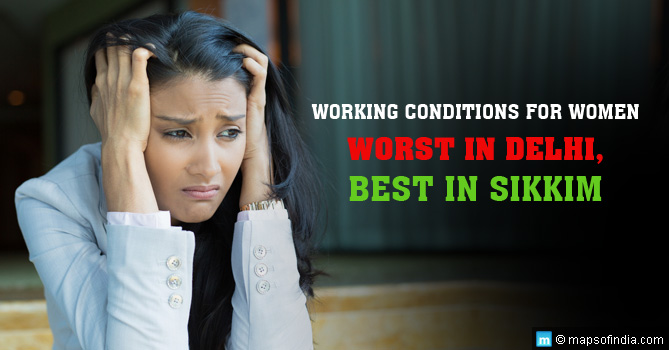Sikkim has become the best destination for working women in India as per a report, which has also stated that Delhi has the worst conditions for the same group of individuals. This is an unfortunate finding, considering the latter’s status as the national capital, which is supposed to be the premier destination for each and every aspect of life.
The report has been compiled by one of the leading thinktanks from the US – Center for Strategic and International Studies (CSIS) – and an organization named Nathan Associates. The highest possible rating for a region is 40, the number Sikkim has scored.
The sorry state of affairs in Delhi
Delhi has scored just 8.5 points, which shows the critical state of conditions for working women in the region, and also several other problems that only seem to be getting bigger with every passing day. Four factors were used to rank the states and union territories – the number of hours women can legally work in factories, IT industry, and retail sector; how responsive the law and order machinery in the state is when it comes to acts of crime being perpetrated against women like sexual harassment; percentage of women working in the state; and the amount of incentives that enable women to start their own businesses in the city.
What made Sikkim score so high?
The report has said that there are several factors that went in favour of this small state in northeastern India. There are a lot of women working over there – perhaps one of the highest in the country – and there are no restrictions on the amount of hours women can put to work. Also, crimes against women rarely go unpunished here.
How do other states stack up?
The following table provides the list of states and union territories that are there on the said list after Sikkim:
| State | Ranking |
| Telangana | 28.5 |
| Puducherry | 25.6 |
| Karnataka | 24.7 |
| Himachal Pradesh | 24.2 |
| Andhra Pradesh | 24.0 |
| Kerala | 22.2 |
| Maharashtra | 21.4 |
| Tamil Nadu | 21.1 |
| Chhattisgarh | 21.1 |
There are no restrictions on the working hours of women in Sikkim, Karnataka, Andhra Pradesh, and Tamil Nadu. This implies they can work at night as well. In the latter three it was a court judgment that prompted the removal. In Maharashtra, women are allowed to work in retail establishments till 10 pm. This is why it missed out on the perfect score. However, in nine union territories and states, women don’t have the permission to work at night in any sector.
Problems for women entrepreneurs and women in India
As per the report, in 15 states and union territories there are no special incentives for women to start their own enterprises. As it is, India has a women workforce participation rate of 24%, which is the lowest in the world. A report instituted by McKinsey Global Institute in 2015 says that its growth rate has also been quite low of late. If the rate of workforce participation of women was the same as men, then India could add 16% to its GDP in the next decade.
There are plenty of states that have laws, which clamp down on the working hours of women. They also face problems such as harassment while commuting to and from work, and at their workplace as well.
A Thomson Reuters survey has recently rated India as the fourth most unsafe place in the world for women. The image of India in certain circles is that of a land where men have been sexually repressed for ages and that repression is now expressing itself in the form of violence. What a shame!
Where does Delhi lack?
The report has expressed surprise at the way Delhi has fared so poorly on the index. It points out that enforcement of law in case of criminal actions against women is relatively less and so is participation of women in the workforce.
The state also forbids women from working at night in various sectors. Its industrial policy also does not have any special benefit for women entrepreneurs. The situation in Delhi is such that a lot of women are in perpetual terror of being wronged every now and then. The percentage of such women can be pegged at 80%. Unbelievable? Read on.
The general situation
This includes people as well-off as bankers. Lots of them prefer to return to home from work with their male partners, because without them, women can be seen as easy target. For them going home alone in the dark is not an option. They point out that after 8:30 pm at night the buses become less frequent and during the winters the roads are deserted. Several ladies feel that hiring a bodyguard for their safety could be an appropriate step.
Problems for women living alone
Women who live alone face even more problem in Delhi, where such form of living is not socially acceptable. They are expected to live in their father’s home till they get married. Such women are normally regarded as either helpless or the ones who can be wronged easily. They can be harassed by neighbours and other members of the immediate community, and do face problems in getting a home to live if they are unmarried.
Problems for unmarried women
Unmarried women in Delhi have reportedly been on the receiving end of more incidents of sexual harassment than their married counterparts. This is inclusive of both work and on street. In general, unmarried women in Delhi can be violated in their private spaces as well. It can be a lewd comment, and physical violence. The situation of married women is marginally better, because they can seek help from their family. They also have to make changes to their lifestyles as a result of the situation that they face.
Lifestyle changes forced by circumstances
They normally have had to avoid unsafe areas, never travel alone at night, stay away from crowded places, and just shy away from any problematic situation in their personal and professional lives. Worse still, most of them are not even willing to seek help from police or any other relevant authority for a problem that they face.
Apart from safety and security, they face challenges like financial problems, health crises, and emotional problems. Safety and security, while commuting, remains the biggest challenge though. Frequent instances of molestation, vulgar staring, and people invading their privacy are also major issues for women in general in Delhi.
Problems for migrant women
The situation is no different for women and ladies migrating from other states – especially the northeastern part of the country. Hate crimes against members of this community are quite frequent and women, in such a situation, cannot be an exception. One of the major causes of the problem, according to authorities, is the lack of state-backed accommodation options for them.
Since, they don’t have such options they have to stay in expensive and unsafe places, where anything may happen to them at any time. There are only 11 hostels for working women in Delhi and 13 new ones are underway. Still, it may not be sufficient.
Attitude of men
The general trend of behaviour of men in the city is also regarded as one major reason for the multitude of problems faced by women, with the other being socio-economic divide. The situation is so dire that it seems that the women have to take it upon themselves to be safe since on some occasions even the authority doesn’t help them.
Experts say that it is the supposedly-bold, judged entirely by attire in some cases, and modern women who are breaking into erstwhile male-dominated spaces that need to be most careful. In most cases, men don’t want to intervene as well.
A solution?
For some women in Delhi – who are not afraid to speak up – the authority is to be blamed for this situation, as well for its inability to enact strict and punitive laws; other than the frequent blaming of the dressing sense of girls, and women for the crimes committed against them.
These women and girls also question the way members of their fraternity – and their characters questioned – are viewed if they dress in a supposedly-inappropriate manner and ask why the same logic is not applied to men when they dress in a similar manner. For them – a miniscule portion – women in Delhi need to speak up and teach the criminals a lesson instead of being cowed down and suffering in silence.






